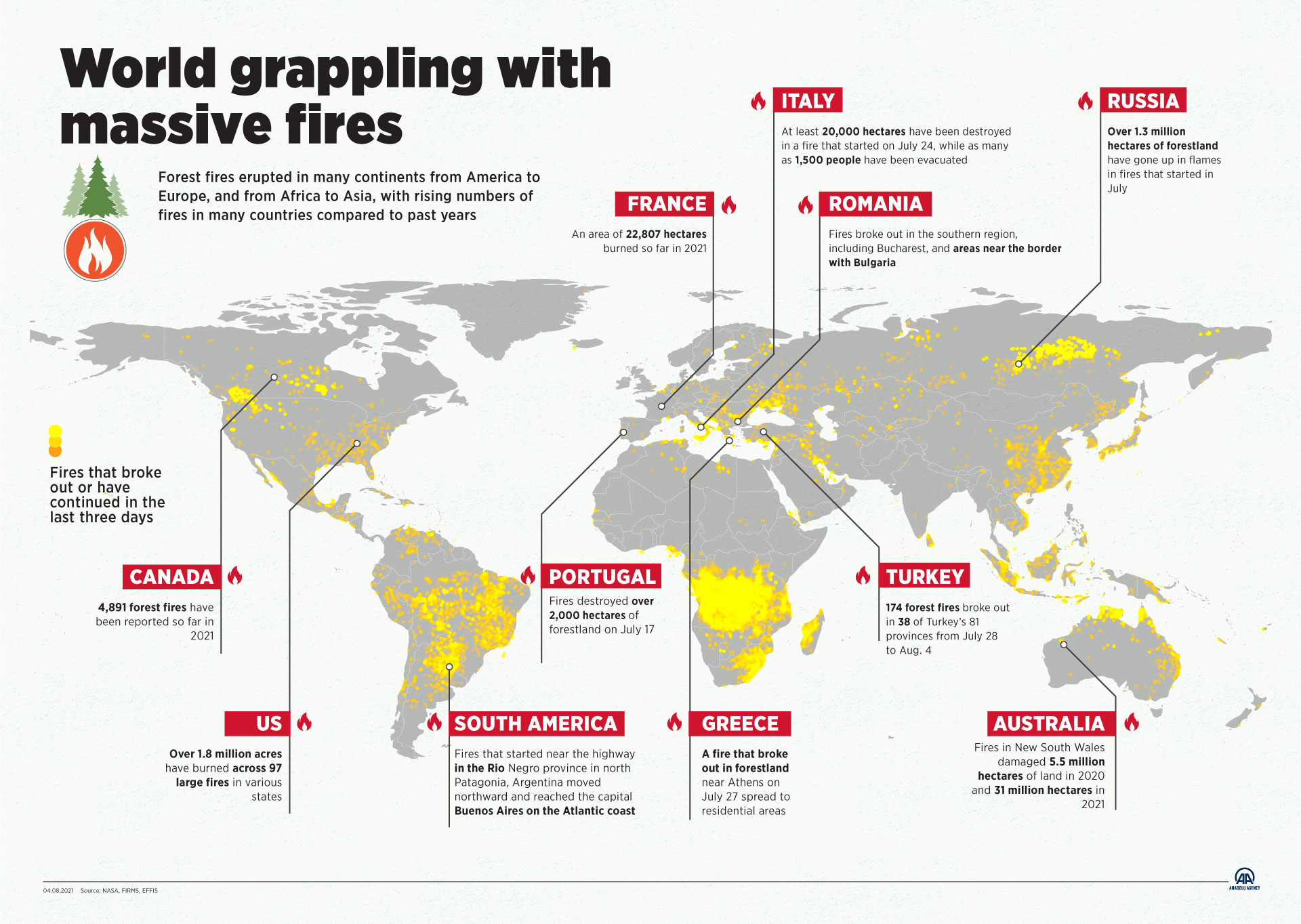

By Anadolu Agency
ANKARA, TURKEY
Wildfires have spread to many parts of the world, according to the Fire Information for Resource Management System of US space agency NASA.
Most of North and South America, the African plateau, the northern Arabian Peninsula, and the Mediterranean coast of Europe as well as Northern and Eastern Europe have been affected by fires.
In Asia, fires have been detected on the coasts of India and in Russia’s Siberia region as well as in China, Malaysia and Indonesia.
European countries with Mediterranean coasts such as Italy, Spain, and Greece are also struggling with forest fires.
According to a European Commission emergency map, large and small fires on the entire continent reach almost as far as northern Russia. Satellite maps show that fires of various sizes have been burning for at least a week in various EU countries.


Turkey
Turkey has successfully contained 160 of 174 wildfires that have emerged since last week, according to a Wednesday statement by the country’s Forestry Directorate.
The directorate said in a statement that the wildfires took place in 39 of Turkey’s 81 provinces, adding that the remaining 14 blazes are ongoing in five provinces around southern/southwestern Turkey: Antalya, Mugla, Aydin, Isparta, and Denizli.
The statement said the directorate responded to wildfires in 98 rural areas with 16 firefighting aircraft, nine unmanned aerial vehicles (UAVs), 51 helicopters, one unmanned helicopter, 850 firefighter trucks and water tankers, 150 construction vehicles, and 5,250 personnel.
Firefighting efforts on the ground continue day and night, and aerial elements play an important role in the operations. Once a fire is contained at a location, authorities immediately start cooling down the area to prevent more fires from breaking out.
Working to detect and locate fires, unmanned aerial vehicles (UAVs) have logged 462 hours in the air.
Turkish army UAVs get real-time visuals in wildfire-prone areas and share them with a coordination center that sends them to aerial firefighting vehicles, telling them the location and direction of wildfires.
Italy
Southern parts of Italy especially are facing many forest fires, both large and small.
According to Italy’s National Fire Corps, more than 800 fires have broken out in the country in the last 24 hours.
Firefighters have responded to 250 fires on the island of Sicily and 130 in Puglia in the country’s “heel,” while 20,000 hectares of forest burned in a fire on July 24 in rural areas of the island of Sardinia, where 1,500 people were evacuated.
Italy requested firefighting aircraft from fellow EU countries to supplement its own.
Spain
On July 26, the largest forest fire in the last two years broke out in the northern Catalonia region, while 1,657 hectares of land burned in Santa Coloma de Queralt in the Tarragona region, forcing the evacuation of 168 people from residential areas.
Greece
Greek authorities reported 58 forest fires in the last 24 hours.
The fires intensified around the western port city of Patras and in the town of Soufli, near the Turkish-Greek border.
Russia
Efforts are still underway to extinguish forest fires that started this month in Russia’s northeastern Yakutia region.
Authorities declared a state of emergency in the region, where over 1.3 million hectares of forestland have gone up in flames.
Russia’s Ministry of Emergency Situations reported last Thursday that teams are working to extinguish fires that are continuing in 144 locations.
US and Canada
In the US, according to Monday data from the National Interagency Fire Center, around 450,000 acres of forest have burned in 91 blazes in 13 states. Also, new blazes were reported in the states of Idaho, Alaska, and Minnesota.
In the US’ northern neighbor Canada, 4,576 forest fires have been reported so far this year. This amounts to 1,000 times more the average rate of the last decade.
LAST UPDATE: August 4th, 2021 05:56 pm
We use cookies on our website to give you a better experience, improve performance, and for analytics. For more information, please see our Cookie Policy By clicking “Accept” you agree to our use of cookies.
Read More